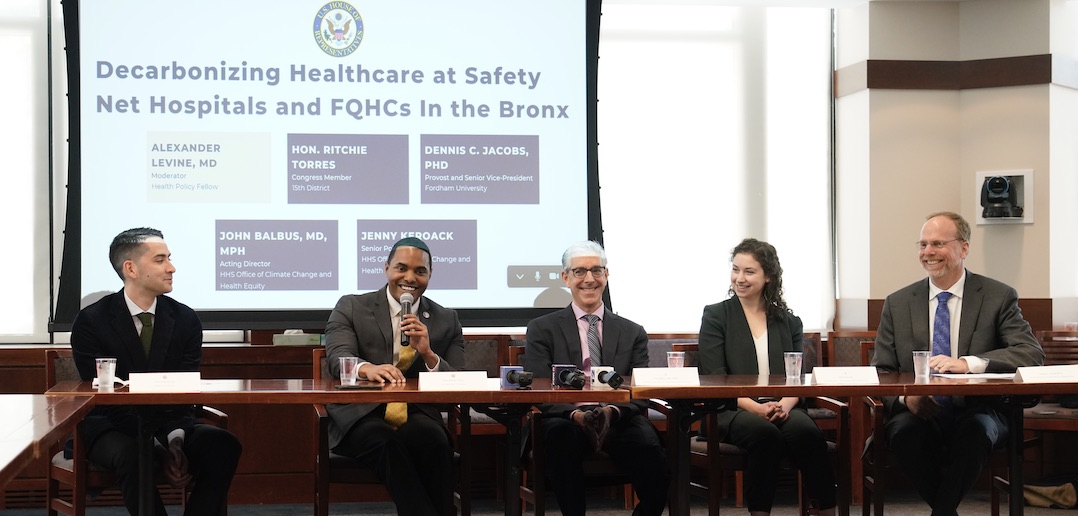At the Climate Action Summit held April 8 at Rose Hill, several elected officials were on hand to celebrate Fordham’s new role as an EPA grantmaker. U.S. Senate Majority Leader Chuck Schumer told the crowd, “We couldn’t have thought of a better place than Fordham” to dispense the federal funding, which will go to grassroots groups focused on climate justice.
Answering a call from Pope Francis, Fordham is indeed a place committed to taking “concrete actions in the care of our common home.”
Here are some updates from the first quarter of 2024, from student sustainability interns to “cool” foods to fun community events that make an impact.
Facilities
In January, 11 more undergraduate students joined Fordham’s Office of Facilities Management as sustainability interns to help the University in its efforts to reduce its carbon emissions. They’re working on projects connected to AI-enabled energy systems, non-tree-based substitutes for paper, and composting. The office is still looking for three more students to join; email Vincent Burke at [email protected] for more information.
Dining
Stroll into a dining facility at the Rose Hill or Lincoln Center campus, and you’ll find “Cool Food” dishes such as crispy chicken summer salad, California taco salad, and spicy shrimp and penne.
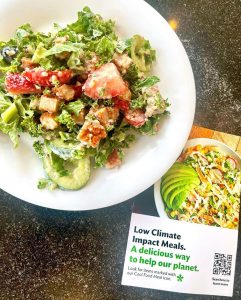
The dishes, which are marked by a distinctive green icon at the serving station, have a higher percentage of vegetables, legumes, and grains, which generally have a lower carbon footprint than those with beef, lamb, and dairy. According to the World Resources Institute—which Fordham partnered with on the Cool Food project—more than one-quarter of the world’s greenhouse emissions come from food production.
In March, the University went one step further by signing onto the New York City Mayor’s Office Plant-Powered Carbon Challenge. The pledge commits Fordham and Aramark to reduce our food-supply carbon emissions by a minimum of 25% by the year 2030.
Academics
This semester, a new one-credit, university-wide experiential learning seminar titled Common Home: Introduction to Sustainability and Environmental Justice was taught by faculty and staff from the Gabelli School, the Center for Community Engaged Learning, the Department of Facilities, the Department of Biology, and the Department of Theology.
Other sustainability-focused courses this semester include the City and Climate Change, the Physics of Climate Change, and You Are What You Eat: the Anthropology of Food (Arts and Sciences); Sustainable Reporting and Sustainable Fashion (Gabelli School of Business); and Energy Law and Climate Change Law and Policy (Law).
Students Take the Lead
At Fordham Law School, the student-run Environmental Law Review hosted a March 14 symposium that considered the impact of artificial intelligence on environmental law. Panels focused on how regulators and litigators can use AI and the challenge of addressing AI-generated climate misinformation.
In January, Fordham Law student Rachel Arone wrote The EPA Rejected Stricter Regulations for Factory Farm Water Pollution: What This Means, Where Things Stand, and What You Can Do for the Environmental Law Review. And the Law School’s student-faculty-staff collective Climate Law Equity Sustainability Initiative held a series of lunchtime discussions about climate change, law, and policy.
Student groups LC Environmental Club and Fashion for Philanthropy teamed up on March 8 to create reusable tote bags on International Women’s Day. The bags were donated to Womankind, which works with survivors of domestic/sexual violence and trafficking.
The United Student Government Sustainability Committee continues to run the Fordham Flea, a student-run thrift shop that connects students interested in selling old clothes with those looking to buy sustainably. The next flea will take place on April 26 from 11 a.m. to 2 p.m. outside of the McShane Center.
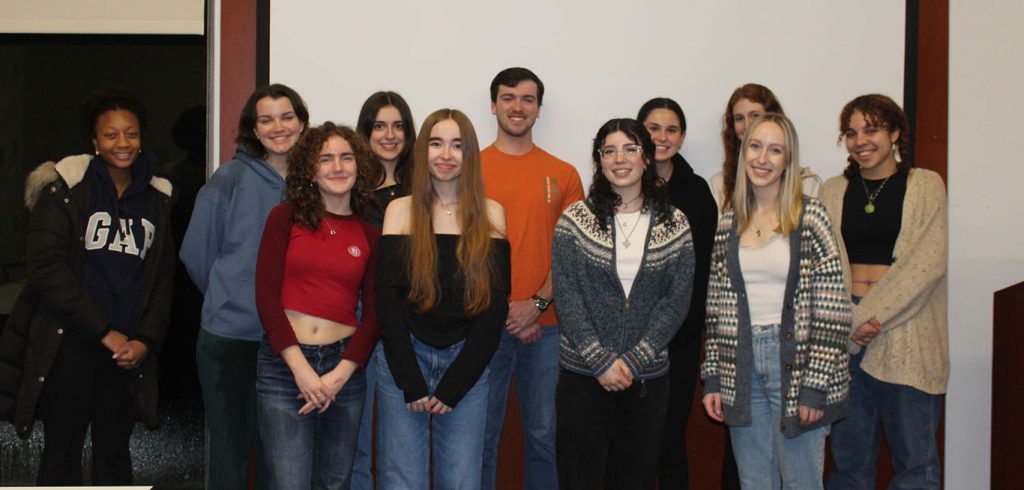
Community Engagement
The Center for Community Engaged Learning (CCEL) held an Urban Agriculture and Food Security Roundtable on Feb. 2. The gathering brought together community organizations and leaders from the Bronx to discuss urban agriculture and food security. Attended by Bronx Congressman Ritchie Torres, the meeting was also an opportunity for groups to learn about resources available from the USDA and the New York City Mayor’s Office on Urban Agriculture.
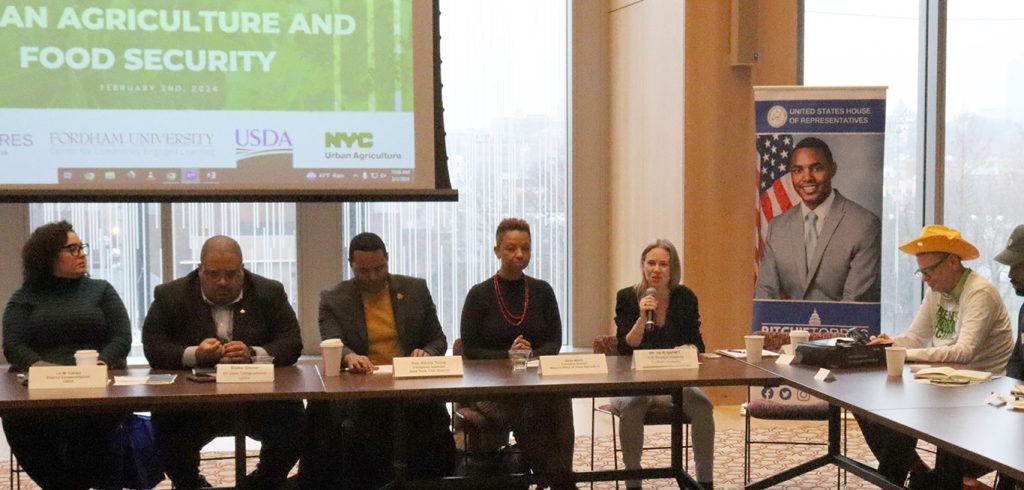
CCEL Director of Campus and Community Engagement Surey Miranda-Alarcon served as a panelist at a March 9 climate justice workshop at SOMOS 2024 in Albany, along with Mirtha Colon, GSS ’98, and Murad Awawdeh, PCS ’19.
Faculty News
David Gibson, director of the Center on Religion and Culture, and Julie Gafney, Ph.D., director of the Center for Community Engaged Learning, attended “Laudato Si’: Protecting Our Common Home, Building Our Common Church” conference at the University of San Diego on Feb. 22 and 23.
Marc Conte, Ph.D., professor of economics, and Steve Holler, Ph.D., associate professor of physics, presented their research around air quality, STEM education, and education outcomes on March 11 at the first night of Bronx Appreciation Week, which the Fordham Diversity Action Coalition organized.
Alumni
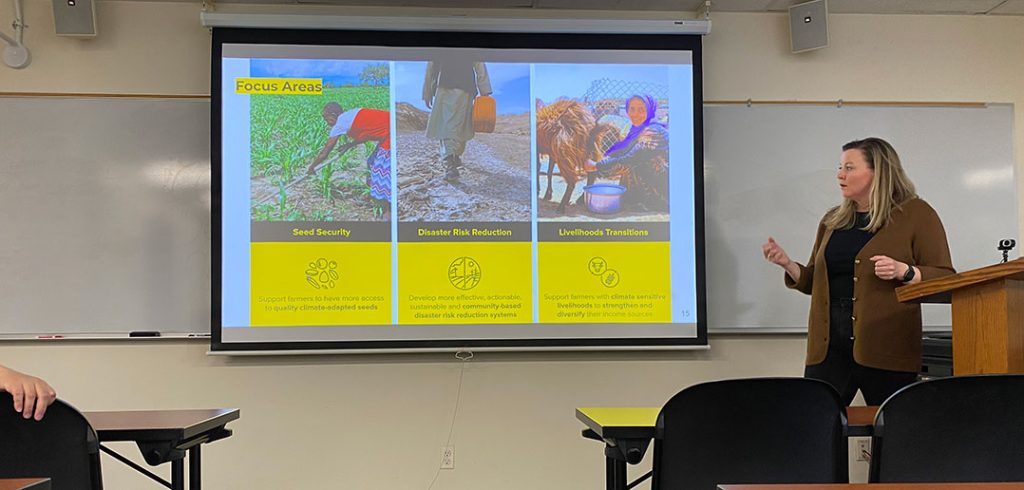
On March 14, Tara Clerkin, GSAS ’13, director of climate research and innovation at the International Rescue Committee, delivered a lecture at the Rose Hill campus titled “The Epicenter of Crisis: Climate and Conflict Driving Humanitarian Need and Displacement.”
In Case You Missed It
Here are some sustainability-related stories that you may have missed: In January, economics professor Marc Conte published the findings of a study that examined whether people living in areas with more air pollution suffer more from the coronavirus. The Gabelli School of Business partnered with Net Impact, a nonprofit organization for students and professionals interested in using business skills in support of social and environmental causes. A group of the Gabelli School Ignite Scholars traveled to the Carolina Textile District in Morgantown, North Carolina, to learn the benefits of sustainable and ethical manufacturing.
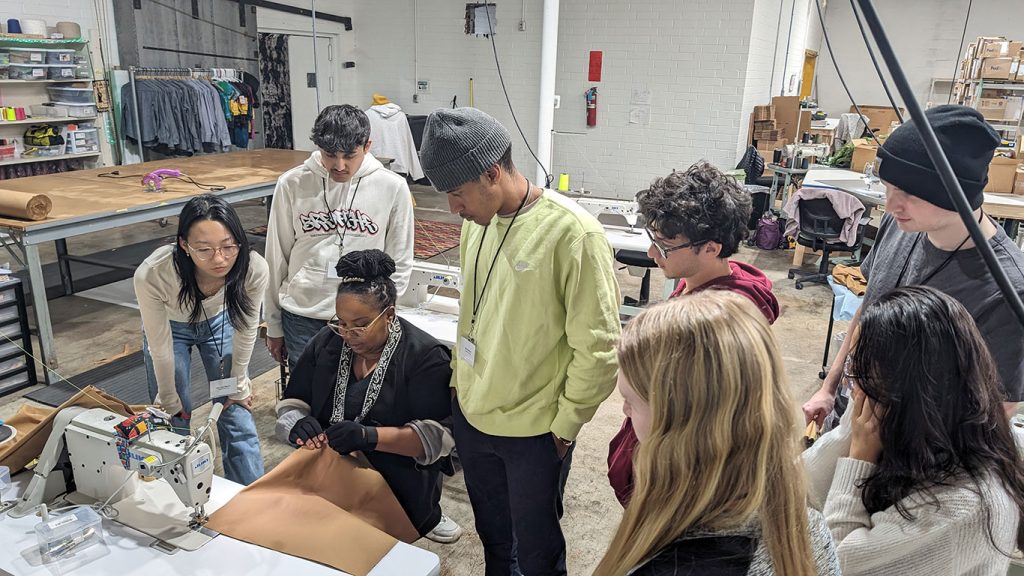
Upcoming Events
April 12 and 19
Poe Park Clean-up
In celebration of Earth Day on April 22, the Center for Community Engaged Learning is organizing visits to the park, where volunteers can help pull weeds and spread mulch. 10 a.m. – 2 p.m., 2640 Grand Concourse, the Bronx. Sign up here.
April 13
Bird Watching in Central Park
Law professor Howard Erichson will lead students on a birdwatching tour of Central Park, where they hope to spot and identify a few of the hundreds of species that pass through Fordham’s backyard on their annual migration routes. Meet at the Law School lobby at 9:30 a.m. Contact [email protected] to reserve a spot.
April 13
Ignatian Day of Service
Students and alumni will meet at the Lincoln Center campus and walk over to nearby Harborview Terrace, where they will build a community garden with residents. Lunch and a conversation about Ignatian leadership will follow. 10 a.m. – 2 p.m.
Click here to RSVP.
April 15
ASHRAE NY Climate Crisis Meeting
The theme of this meeting of the American Society of Heating, Refrigerating, and Air-Conditioning Engineers is “Challenge Accepted: Tackling the Climate Crisis.” All are welcome.
7 a.m.- 1 p.m., Lincoln Center Campus. Contact Nelida LaBate at [email protected] for more information or register here using code FordhamStudent2024.
We’d Love to Hear From You!
Do you have a sustainability-related event, development, or news item you’d like to share? Contact Patrick Verel at [email protected].
]]>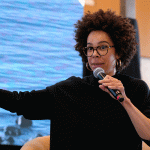
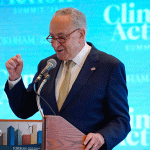
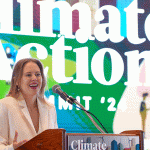
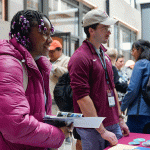
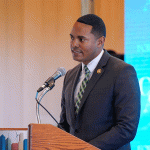
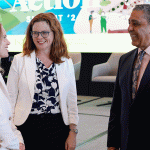
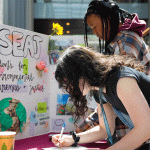
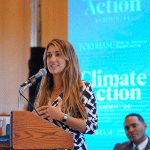
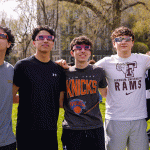
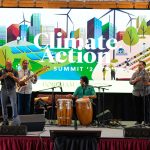
Daylong Event Calls for Grassroots Action and Celebrates Fordham’s Role as EPA Grantmaker
We don’t all have to be scientists to fight climate change, a prominent marine biologist and activist told Fordham students, activists, and members of the Bronx community at Fordham’s Rose Hill campus on April 8.
“I think what the world needs, right now more than ever, are people who can move between different disciplines,” said Ayana Elizabeth Johnson, Ph.D.
“We need people to solve climate problems in business, in engineering, in law, in medicine … all of these things relate to the world and how it’s changing. Everyone needs to know at some fundamental level what’s happening.”
Johnson, a marine biologist and co-founder of the group Urban Ocean Lab, was the keynote speaker of Fordham’s second annual Climate Action Summit. Her speech, on a day when millions of Americans paused to take in a rare solar eclipse, was a reflection of her personal journey and activism taken from her forthcoming book, What If We Get It Right? (Penguin Random House). She also sat for a Q&A session with H. Shellae Versey, Ph.D., an associate professor of psychology at Fordham.
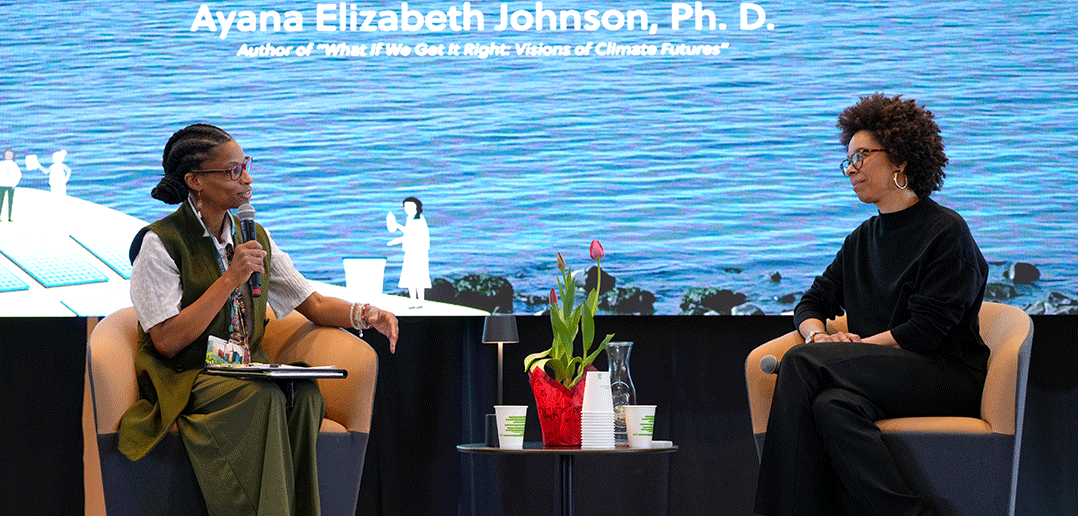
The work she’s done on behalf of communities from New York City to the Caribbean, she said, was always bolstered by a belief that anyone can be a part of the fight–including those who, like her father, were held back by racism, or those like her, “brimming with juxtapositions.”
“I’m a scientist who always intended to have a career in policy. I’m the daughter of a practical school teacher and a wistful artist. I’m cold New York winters and Caribbean heat,” she said.
“I’m working class and Harvard. I’m Black and white. I’m urban and smitten with the wilderness. I’m proof of the American dream—and proof that it is all too rare.”
The notion of taking a leadership role in fighting climate change was also the focus of other activities during the summit, which was organized by Fordham’s Center for Community Engaged Learning. An expo featured community groups, fireside chats, and panel discussions that examined federal funding for community-led solutions, as well as the future of environmental justice in higher education.
Elected Officials Celebrate Fordham’s Role as EPA Grantmaker
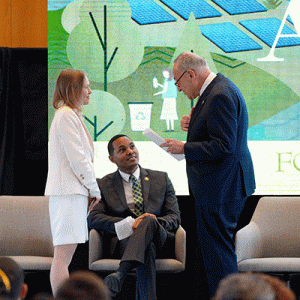
A morning press conference featured Senate Majority Leader Chuck Schumer and Congressman Ritchie Torres, who praised Fordham for taking on the responsibility of distributing $40 million EPA funds through a grant it was awarded in December. The grant, which will be administered by the Center for Community Engaged Learning, was the direct result of the Inflation Reduction Act (IRA), which was passed in 2022.
No Better Place
“We couldn’t have thought of a better place than Fordham to dispense this [funding]to go to grassroots groups,” said Schumer, who was instrumental in passing the IRA.
Torres added the program is benefiting the Bronx not by accident, but by design. “We designed the Inflation Reduction Act to lift up the lowest-income communities of color, especially the Bronx, which has been Ground Zero for environmental injustice,” he said.
The Bronx Is Not Burning; the Bronx Is Greening
“For a Bronx-based institution to receive $50 million in federal funding to distribute throughout the region is nothing short of staggering and unprecedented. And so, with the partnership of Fordham University, we are writing a new chapter in the story of the Bronx. The Bronx is not burning; the Bronx is greening.”
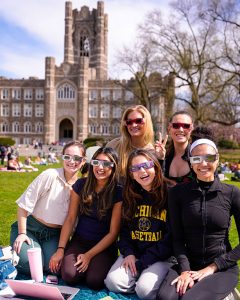
Also attending the celebration was U.S. Rep. Adriano Espaillat. Others who could not attend sent staff members, including Gov. Kathy Hochul, Sen. Kirsten Gillibrand, U.S. Rep. Paul Tonko, Bronx Borough President Vanessa Gibson, City Council Member Oswald Feliz, Westchester County Executive George Latimer, and Ulster County Executive Jen Metzger. See more elected official comments here.
Tania Tetlow, president of Fordham, said the grant, which will see the Center for Community Engaged Learning working with partner organizations from New York to Puerto Rico, epitomizes the mission of Fordham.
“This is so very us, this idea of connecting science with justice, of thinking about how we wake people up to the dangers ahead, and the chances to work together and inspire action and bring hope to an issue that can make us all despair and want to look away,” she said.
Julie Gafney, Ph.D., assistant vice president for strategic mission and executive director of the Center for Community Engaged Learning, thanked those responsible for the funding, community partners, and all those that will be involved in the project.
“Many of you are going to be partners in this work as we move ahead and really reorient Fordham around an initiative of public impact and social responsibility and see how traditional teaching, learning, and research can be leveraged in real-time toward community solutions.”
]]>Below are sentiments they have shared as Fordham begins this critical and historic work.
“This first-of-its-kind effort, that I made sure we amply funded in the historic Inflation Reduction Act, to directly invest in grassroots environmental justice groups is critical to fighting the carbon pollution worsening asthma, driving climate change and increasing the likelihood and severity of devastating extreme weather events,” said U.S. Senate Majority Leader Charles Schumer. “This $50 million for Fordham University to fund environmental justice projects is the kind of program that can help our disadvantaged communities effectively fight the pollution that harms them. I am proud of Fordham University and I’m so excited to see how the vibrant network of New York and Puerto Rican grassroots environmental justice organizations access and activate this federal funding. I remain laser-focused on implementing the IRA so that we can ensure it lives up to its transformative potential to clean our air and combat climate change.”
“EPA’s Environmental Justice Thriving Communities Grantmaking program is a vital new program that will advance environmental justice and help communities disproportionately impacted by climate change, pollution, and other environmental stressors,” said U.S. Senator Kirsten Gillibrand. “I am thrilled to see that Fordham University has been selected as the Grantmaker for EPA Region 2, which will allow organizations in New York, other communities within the Region, and Puerto Rico to apply for funds to support a range of different environmental project activities that will help the communities most in need. I am proud to have worked with and supported Fordham University to help secure its selection as a grantmaker and look forward to seeing communities that have long faced underinvestment gain access to federal environmental justice funding.”
“Fordham University’s commitment to environmental justice through its Flourishing in Community program and Climate Action Summit 2024 has been exemplary,” said U.S. Representative Ritchie Torres (NY-15). “By investing $40 million in grants to community-based organizations with a prioritization on marginalized communities, Fordham is not just talking about change — they’re actively implementing it. Initiatives like these, focusing on participatory governance and community-led solutions, are crucial for a sustainable future for the Bronx and the nation. I commend Fordham for their leadership and hope more institutions follow their example.”
“Fordham University’s resounding call to action comes in the form of their EPA Grant, which will facilitate climate justice initiatives for environmentally disadvantaged communities in the Bronx,” said City Council Member Oswald Feliz. We are constantly working to provide accessibility to communities disproportionately affected by pollution and climate change. With Fordham’s Climate Action Summit, we will witness new insights on sustainability and environmental justice for our Bronx community.”
]]>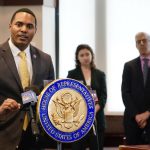
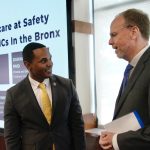
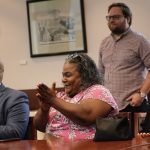 Elected officials convened at Fordham to discuss the new Inflation Reduction Act—“America’s largest investment to fight climate change,” according to The New York Times—and how the Bronx can use it to its advantage.
Elected officials convened at Fordham to discuss the new Inflation Reduction Act—“America’s largest investment to fight climate change,” according to The New York Times—and how the Bronx can use it to its advantage.
“Nowhere is it more critical than here in the Bronx,” said Ritchie Torres, the U.S. representative for New York’s 15th congressional district that covers most of the South Bronx, an area with notorious levels of air pollution and high asthma rates. “For me, it’s not only about environmental protection. It’s about public health.”
The forum, which was sponsored by Fordham’s Center for Community Engaged Learning, took place on June 9—coincidentally, just several days after New York City recorded its worst air quality on record.
“The extreme air pollution that we have seen firsthand here in the Bronx is a glimpse of what can happen if we do nothing or do too little to combat climate change,” said Representative Torres. “This is not speculation. This is reality.”
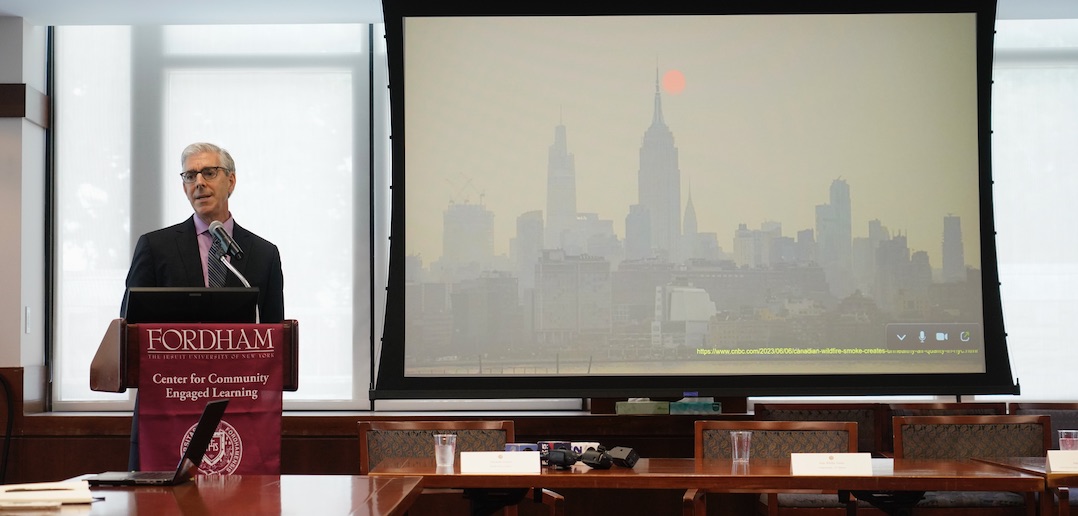
The Inflation Reduction Act, a new climate and tax law signed by President Joseph Biden last year, is designed to combat climate change, in part by providing monetary incentives to individuals and businesses. This is relevant to the Bronx and its health care sector, which has the power to play a big role in decarbonizing the borough, said Representative Torres.
“The road to decarbonizing America is going to run through the health care sector because you are the largest employers in the Bronx and elsewhere in the country,” he said, addressing about 20 Bronx health care leaders at the forum. “Twenty-five percent of the Bronx economy is health care; 10% of greenhouse gas emissions is coming from the health care sector.”
Using a PowerPoint presentation, members of the federal Office of Climate Change and Health Equity explained how they are assembling the most relevant parts of the Inflation Reduction Act for the health sector in an online quickfinder, where they can learn more about and take advantage of tax incentives, direct pay provisions, and grants.
Opal Dunstan, chief operating officer of VIP Community Services, a community health center in the Bronx, said the forum was helpful, but voiced caution.
“At least we know that the federal government sees the correlation between what’s happening outside and how it impacts the organizations that we operate, but in order to do the things we need to do to address [climate change], we need to have money. … We’re in old buildings and we need to upgrade, but these things have costs,” said Dunstan, adding that she will examine the quickfinder and research tax incentives and grants that could benefit her community center. “It was good information, and hopefully it will help us.”
]]>